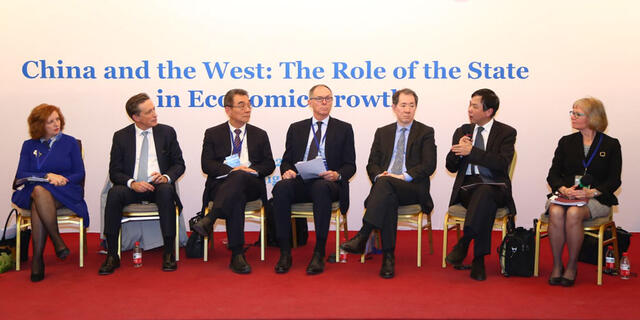
SIPA Hosts 2019 China and the West Conference in Beijing

SIPA hosted its fourth annual conference on China and the West: The Role of the State in Economic Growth last week, convening more than 40 high-level participants in Beijing for roundtable discussion.
The event, led by Dean Merit E. Janow and CGEG director Jan Svejnar, focused on key economic challenges facing China and its global partners, especially Europe and the United States. Topics ranged from monetary policy and financial policy—which included steps taking to slow credit growth in China as as well as interest in the Fed’s monetary policy—to trade policy, over which most participants felt positive that the U.S.-China tensions would alleviate in the near future and that trade terms would come back to normal—to the need for innovation and policy reforms in order to increase long-run potential growth.
Attendees also discussed industrial policy, considering among other issues how China can move ahead in its economic policy in the areas of frontier innovation, new technologies, and entrepreneurship. Many participants agreed that this is the time for what they called “indigenous innovation” and heightened risk-taking in order to bring China to the next stage of technological development and usher it into high-income country status.
They also examined what it means in different cultures and countries to refer to “the state,” suggesting that countries with different understandings may pursue, and require, different solutions to problems of growth, governance, and good policy.
The conference, originally conceived as part of Columbia President Lee Bollinger’s Global Initiative Fund, has grown into a multi-year, multi-continent research and policy dialogue led by SIPA’s Center on Global Economic Governance. Each year the event engages academics, business leaders, and policymakers in rethinking how the state — as conceived in various parts of the globe — can better promote both domestic and global economic growth and sound policy to support continued positive growth.
Programming associated with the conference has become an annual tradition in China, where SIPA partners with the Columbia Global Centers Beijing as well as Peking and Tsinghua universities. This year’s conference took place on March 21 and 22 at the Peking University Overseas Exchange Center and was implemented in close partnership with the Institute for New Structural Economics (INSE) at the university.
CGEG also hosts conference-related programming each year in Brazil, and occasionally in other locations.
Other highlights of the 2019 conference included keynote speeches by Xin Zhang, a Columbia alumnus who is deputy administrator of China’s State Administration of Foreign Exchange (SAFE), and Nobel Laureate Edmund Phelps, who is Columbia’s McVickar Professor of Political Economy. Zhang spoke to the conference participants about China’s foreign reserves, the extent of leverage in the Chinese economy and the tools China is employing to keep the economy stable within a very uncertain trade and macroeconomic environment. Phelps discussed prospects for enhancing medium-term growth.
Several SIPA faculty members also spoke, including Joseph Stiglitz, the Nobel Laureate and University professor, who delivered remarks on trade tensions, globalization, and the wave of populism the world has seen in recent years. Patricia Mosser, director of SIPA’s MPA in Economic Policy Management and also its initiative on Central Banking and Financial Policy, talked about on U.S. monetary policy and risks coming from policy normalization. Jan Svejnar, the CGEG director and James T. Shotwell Professor of Global Political Economy, discussed on economic and political stagnancy in Europe. Former U.S. Treasury Secretary Jacob Lew, a visiting professor of international and public affairs, focused on fiscal and financial policies that could strengthen China’s economic position going forward.
The Institute of New Structural Economics and its director Justin Lin, a former chief economist at the World Bank, convened an impressive set of Chinese policymakers and academics. Key participants included Gao Xiqing, former president of the China Investment Corporation; Haizhao Huang, managing director of the China International Capital Corporation; Feng Lu, Chair Professor of Economics at Peking University’s National School of Development; and Chong-En Bai, dean of Tsinghua University’s School of Economics and Management.
Apart from the conference, faculty members Janow, Svejnar, Mosser, and Lew joined David Sandalow of SIPA’s Center on Global Energy Policy for a special program at Columbia Global Centers Beijing. There, before an audience of more than 100 alumni, current students, and fall 2019 admittees, the scholars discussed complications around monetary and trade policy and possible paths forward for the global economy.
After the conference, some faculty remained in Beijing to attend the China Development Forum, a two-day event that convenes leaders in business, government, and academia from around the world to discuss social, political, and economic themes. Some have compared the event to the World Economic Forum in Davos, Switzerland.
— David Caughlin